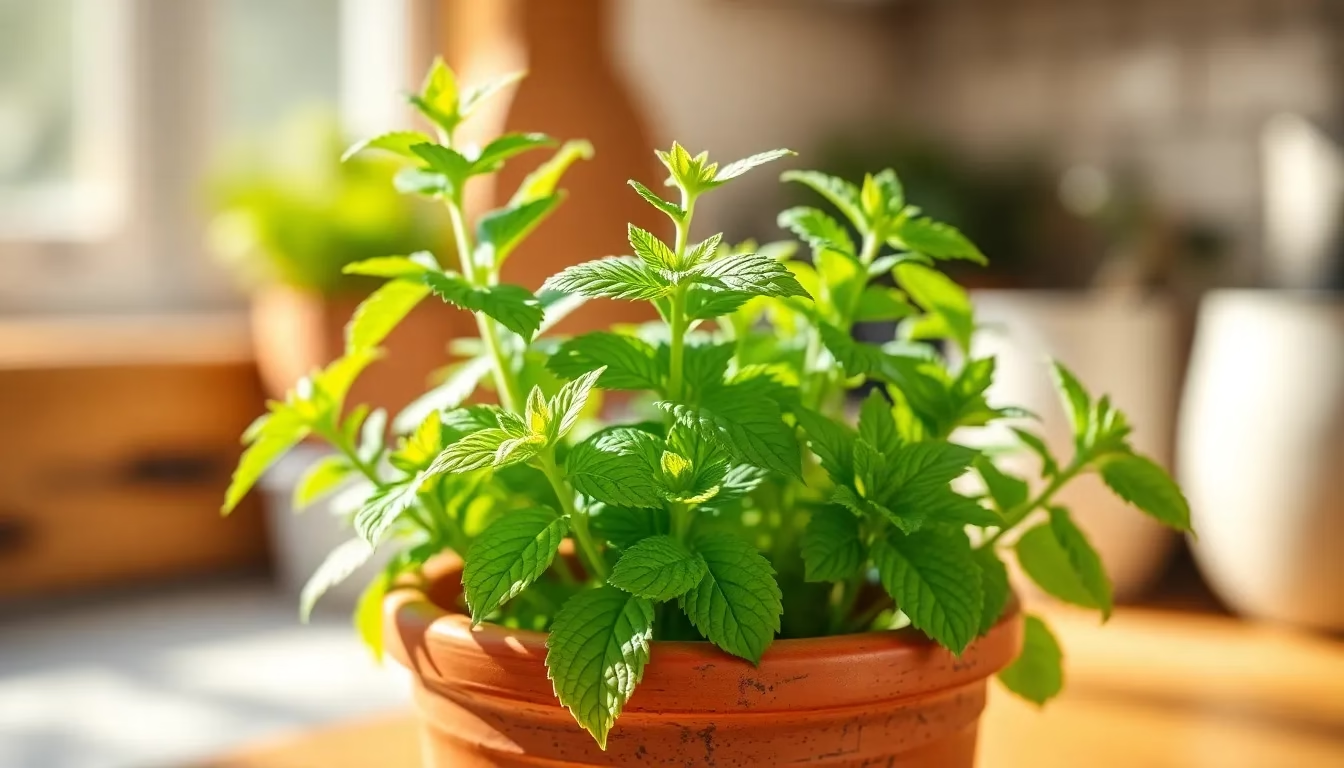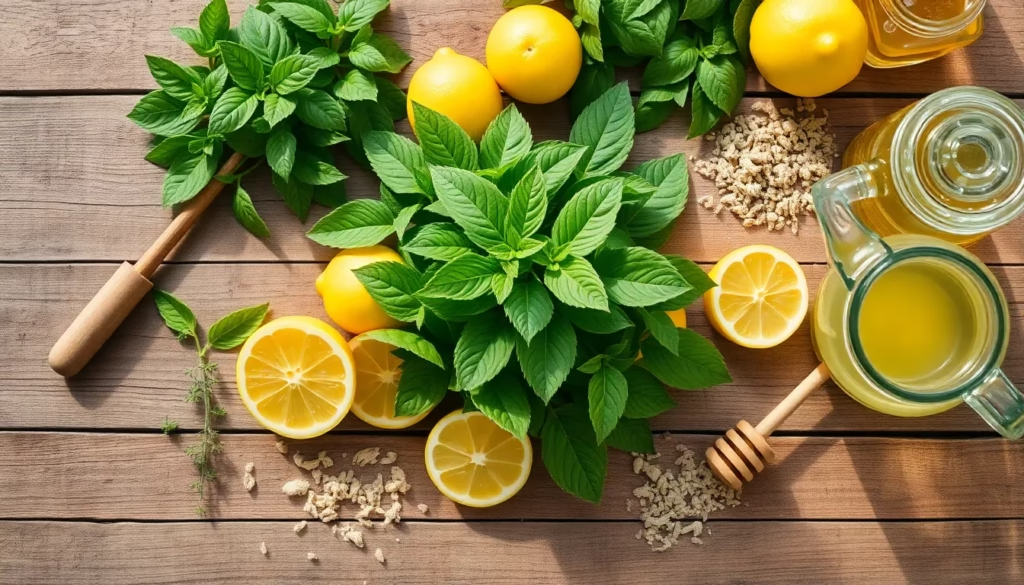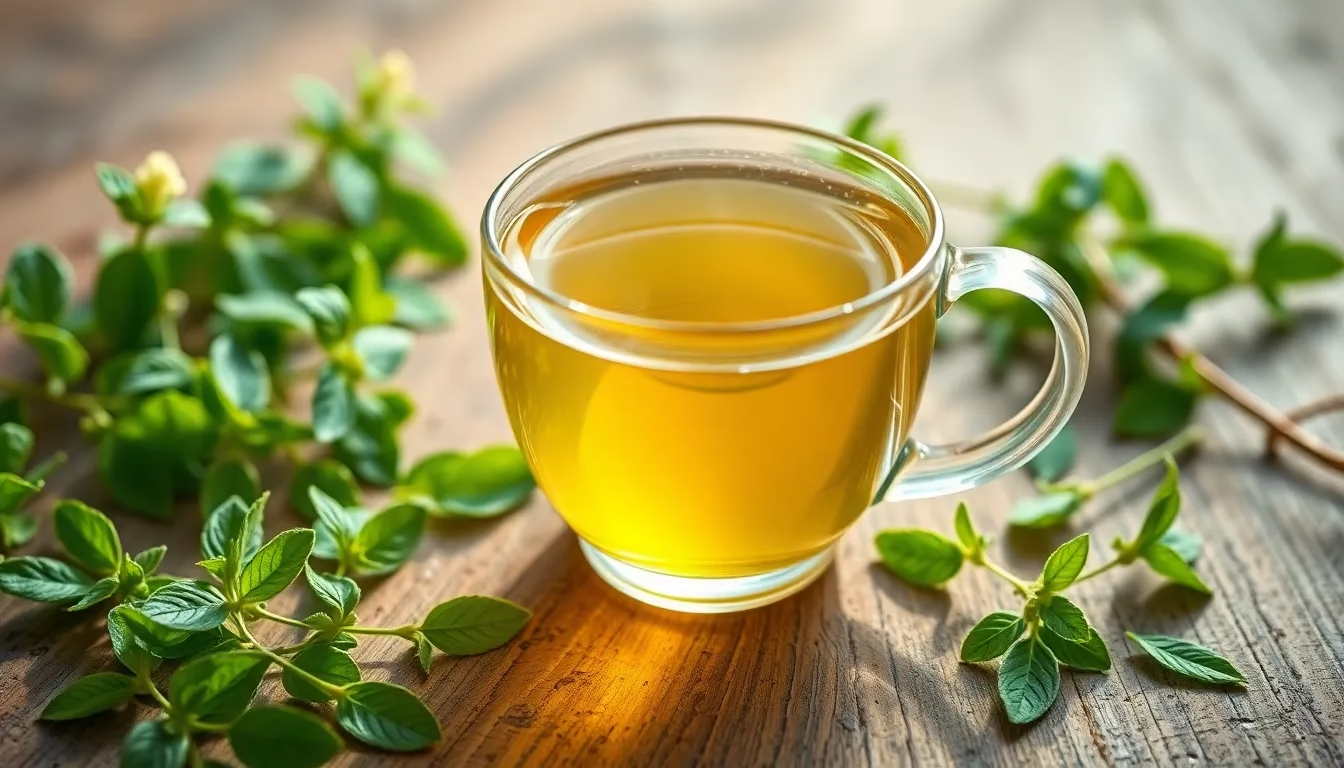Introduction to Lemon Balm Tea
Did you know that over 70% of people seeking natural stress relief are turning to herbal teas? Lemon balm tea stands out as a remarkable beverage that not only soothes your senses but also offers incredible health benefits. Whether you’re a tea enthusiast or someone looking for a natural wellness solution, this guide will walk you through everything you need to know about brewing the perfect cup of lemon balm tea.
Table of Contents
What is Lemon Balm?

Lemon balm is a fragrant herb from the mint family, scientifically known as Melissa officinalis. Native to Europe and the Mediterranean region, this versatile plant is renowned for its gentle lemony scent and calming properties. Its bright green leaves are not just aromatic but packed with therapeutic compounds that make it a popular choice for herbal tea lovers.
Botanical Origins
Botanically, lemon balm belongs to the Lamiaceae (mint) family, characterized by square stems and opposite leaves. It grows best in temperate climates, thriving in partial shade with well-drained soil. The plant typically reaches 1-2 feet in height and features small white or pale pink flowers that attract pollinators like bees, earning it the nickname “bee balm” in some regions.
Historical Uses
Historically, lemon balm has been treasured for centuries. Ancient Greeks and Romans used it in medicinal practices, believing it could treat various ailments. During the Middle Ages, monks cultivated the herb in monastery gardens, using it to create healing tinctures and calm the mind. Islamic medical practitioners also valued lemon balm for its potential to improve mood and cognitive function.
Why Drink Lemon Balm Tea?
Drinking lemon balm tea offers multiple compelling benefits. Research suggests it can help reduce stress, improve sleep quality, and support digestive health. Its natural compounds may enhance cognitive function and provide mild anxiety relief. With zero caffeine and a pleasant, refreshing taste, it’s an excellent alternative to traditional stimulant-based beverages, making it perfect for those seeking a natural wellness boost.
Understanding Lemon Balm Tea Ingredients
Lemon balm tea is a delightful herbal beverage that offers more than just a refreshing taste. Native to the Mediterranean region, this aromatic herb belongs to the mint family and has been used for centuries in traditional medicine. When you brew lemon balm tea, you’re not just creating a drink, but unlocking a world of subtle citrusy flavors and potential health benefits that can support your overall wellness.
Fresh vs. Dried Lemon Balm Leaves
When making lemon balm tea, you’ll find that both fresh and dried leaves can produce excellent results. Fresh leaves offer a more vibrant, immediate flavor profile, while dried leaves provide a concentrated and longer-lasting herbal essence. Your choice depends on availability, season, and personal preference for intensity of taste.
Harvesting Techniques
To harvest lemon balm leaves effectively, choose late morning after dew has evaporated but before the day’s heat intensifies. Cut stems just above a leaf intersection, leaving enough foliage for the plant to continue growing. Harvest before the plant flowers for the most potent essential oils and flavor concentration.
Storing Lemon Balm
Proper storage of lemon balm is crucial to maintain its flavor and medicinal properties. Dry leaves completely before storing to prevent mold. Use airtight glass containers kept in a cool, dark place. Fresh leaves can be refrigerated for up to a week, while thoroughly dried leaves can maintain quality for 6-12 months when stored correctly.
Complementary Ingredients
Lemon balm tea becomes even more delightful when you introduce complementary ingredients. Mint, ginger, and chamomile can enhance both flavor and potential health benefits. These additions not only create a more complex taste profile but can also amplify the tea’s soothing and therapeutic properties.
Honey and Sweeteners
While lemon balm tea has a naturally mild flavor, adding honey or other natural sweeteners can elevate your drinking experience. Honey not only adds sweetness but brings its own set of health benefits, including antibacterial properties. Consider local, raw honey for the most nutrient-rich sweetening option.
Additional Herbal Combinations
Experimenting with herbal combinations can transform your lemon balm tea into a personalized wellness drink. Try mixing with lavender for relaxation, rosehip for vitamin C, or echinacea for immune support. Each combination offers unique flavor profiles and potential health advantages, allowing you to craft a tea that suits your specific needs.
Step-by-Step Lemon Balm Tea Brewing Methods

Have you ever wondered how to transform a simple herb into a soothing, aromatic beverage? Lemon balm tea is your answer! This guide will walk you through everything you need to know about brewing the perfect cup of lemon balm tea, from selecting the right leaves to mastering brewing techniques that preserve its delicate flavor and numerous health benefits.
Hot Brewing Technique
Brewing hot lemon balm tea is an art that requires precision and care. The key is to extract the herb’s essential oils and delicate flavors without scorching the leaves. You’ll want to use freshly boiled water and follow specific temperature and steeping guidelines to ensure a perfect, aromatic cup that captures the herb’s unique citrusy essence.
Water Temperature
Water temperature is crucial when brewing lemon balm tea. Aim for water that’s just off the boil, around 190-200°F (88-93°C). If the water is too hot, you’ll risk burning the delicate leaves and releasing bitter compounds. Let boiled water cool for a minute before pouring over your lemon balm to extract the most delightful flavors.
Steeping Time
Steeping time can make or break your lemon balm tea. Generally, 3-5 minutes is the sweet spot for optimal flavor extraction. Steep too short, and you’ll miss the herb’s full potential; steep too long, and you’ll end up with a bitter brew. Use a timer to ensure consistent, delicious results every time.
Equipment Needed
To brew the perfect lemon balm tea, you’ll need a few essential tools. Gather a tea infuser or strainer, a kettle, a mug, and fresh or dried lemon balm leaves. Optional but helpful items include a tea timer, a thermometer to check water temperature, and honey or lemon for additional flavor.
Cold Brew Lemon Balm Tea
Cold brew lemon balm tea offers a refreshing alternative to hot brewing. This method extracts the herb’s flavors slowly and gently, creating a smooth, less bitter beverage. Cold brewing is perfect for hot summer days and provides a different flavor profile compared to traditional hot tea preparation.
Refrigeration Method
To cold brew, simply combine lemon balm leaves with cold water in a pitcher and refrigerate for 4-8 hours. Use about 1-2 tablespoons of fresh or dried leaves per cup of water. Strain the leaves before serving, and enjoy a cool, refreshing drink that’s packed with subtle herbal notes.
Serving Suggestions
Serve your lemon balm tea chilled over ice, or add a slice of lemon, a sprig of mint, or a drizzle of honey. For a sophisticated touch, garnish with fresh lemon balm leaves. You can also blend it into smoothies or use it as a base for herbal cocktails and mocktails.
Dried vs. Fresh Leaf Brewing Differences
Fresh and dried lemon balm leaves offer different brewing experiences. Fresh leaves provide a more vibrant, intense flavor and higher essential oil content. Dried leaves are more convenient, have a longer shelf life, and offer a more concentrated, consistent taste. Both can create delicious tea, so experiment to find your preference.
Health Benefits of Lemon Balm Tea

Lemon balm tea isn’t just a delightful beverage – it’s a powerful natural remedy packed with impressive health benefits. When you brew this aromatic herbal tea, you’re unlocking a treasure trove of wellness potential that can support your mental and physical health in surprising ways. From reducing stress to boosting your immune system, lemon balm offers a holistic approach to natural healing that can seamlessly integrate into your daily wellness routine.
Stress and Anxiety Relief
If you’re struggling with stress and anxiety, lemon balm tea might be your natural solution. Scientific studies have shown that this gentle herbal tea can help calm your nervous system, reducing feelings of tension and promoting a sense of relaxation. Its natural compounds interact with neurotransmitters in your brain, helping to lower cortisol levels and create a more balanced emotional state.
Scientific Research
Researchers have conducted multiple studies exploring lemon balm’s potential therapeutic effects. Clinical trials have demonstrated its ability to modulate brain chemistry, with promising results in managing stress-related conditions. These scientific investigations provide credible evidence supporting the traditional use of lemon balm as a natural relaxation aid.
Mental Health Support
Beyond stress reduction, lemon balm shows significant potential for mental health support. Studies suggest it may help improve cognitive function, reduce symptoms of mild depression, and enhance overall mental well-being. By supporting neurotransmitter balance, this remarkable herb offers a gentle, natural approach to mental health management.
Digestive Health
Your digestive system can benefit tremendously from lemon balm tea. This herbal infusion supports gut health by reducing inflammation, easing digestive discomfort, and promoting healthy digestive function. Its natural compounds work gently to soothe your digestive tract and improve overall gastrointestinal wellness.
Calming Digestive Issues
Lemon balm tea has remarkable abilities to calm digestive issues. Its antispasmodic properties can help reduce bloating, minimize stomach cramps, and alleviate gas. By relaxing smooth muscle in the digestive tract, this tea provides a natural and gentle solution to common digestive discomforts.
Gut Health Benefits
Supporting your gut health is crucial for overall wellness, and lemon balm tea can be a valuable ally. Its antimicrobial properties help maintain a balanced gut microbiome, potentially reducing harmful bacteria while supporting beneficial microorganisms. This gentle herb can contribute to improved digestion and a healthier intestinal environment.
Immune System Support
Boost your immune system naturally with lemon balm tea. This powerful herbal drink contains compounds that can strengthen your body’s defense mechanisms, helping you stay healthy and resilient against common illnesses. Regular consumption might provide an extra layer of protection for your immune system.
Antioxidant Properties
Lemon balm is rich in antioxidants that combat free radicals and oxidative stress. These protective compounds help prevent cellular damage, support overall health, and potentially reduce the risk of chronic diseases. By neutralizing harmful molecules, antioxidants in lemon balm tea contribute to your long-term wellness.
Potential Immune Boosters
Your immune system can receive a significant boost from lemon balm’s natural properties. Research indicates that its bioactive compounds may enhance immune cell production and activity, providing your body with additional tools to fight infections and maintain optimal health. By supporting immune function, lemon balm tea becomes more than just a beverage – it’s a wellness strategy.
Creative Lemon Balm Tea Recipes
Exploring creative lemon balm tea recipes can transform your herbal tea experience from ordinary to extraordinary. Whether you’re looking to soothe your senses, boost your health, or simply enjoy a delightful beverage, these innovative recipes will inspire you to experiment with this versatile herb. From refreshing summer blends to warming winter concoctions, lemon balm offers endless possibilities for tea enthusiasts.
Classic Lemon Balm Infusion
The classic lemon balm infusion is a simple yet delightful way to enjoy this aromatic herb. Capturing the plant’s gentle lemony essence, this traditional preparation allows you to experience the pure, unadulterated flavor of fresh lemon balm leaves. It’s the perfect starting point for anyone new to herbal tea brewing.
Basic Recipe
Basic Lemon Balm Tea Recipe
- Summary: A simple, refreshing herbal tea with calming properties
- Servings: 1-2 cups
- Total Time: 10 minutes
- Keywords: Herbal tea, lemon balm, relaxation
Ingredients:
- 2-3 fresh lemon balm springs (or 1 tbsp dried leaves)
- 8 oz hot water
- Honey (optional)
Instructions:
- Boil fresh water
- Place lemon balm leaves in a tea infuser
- Pour hot water over leaves
- Steep for 5-7 minutes
- Remove leaves and sweeten if desired
Nutrition Facts:
| Calories | 0-5 |
| Antioxidants | High |
Flavor Enhancements
Elevate your lemon balm tea with creative flavor enhancements. Try adding a slice of fresh ginger for warmth, a splash of lemon juice for brightness, or a sprig of mint for extra freshness. Experiment with natural sweeteners like honey or stevia to complement the herb’s delicate flavor. Each addition can transform your basic tea into a gourmet experience.
Medicinal Blend Recipes
Discover the healing power of medicinal lemon balm tea blends. These carefully crafted combinations go beyond simple refreshment, targeting specific health concerns with natural, holistic ingredients. By combining lemon balm with complementary herbs, you can create powerful wellness-focused beverages that support your body’s natural healing processes.
Stress-Relief Mix
Stress-Relief Lemon Balm Tea Blend
- Summary: A calming herbal blend to reduce anxiety and promote relaxation
- Servings: 1 cup
- Total Time: 10 minutes
Ingredients:
- 1 tbsp lemon balm
- 1 tsp chamomile
- 1/2 tsp lavender
- 8 oz hot water
Instructions:
- Combine herbs in infuser
- Pour hot water over herbs
- Steep for 7-8 minutes
- Strain and enjoy
Digestive Health Blend
Digestive Health Lemon Balm Blend
- Summary: A soothing tea to support digestive wellness
- Servings: 1 cup
- Total Time: 10 minutes
Ingredients:
- 1 tbsp lemon balm
- 1 tsp peppermint
- 1/2 tsp fennel seeds
- 8 oz hot water
Instructions:
- Mix herbs in infuser
- Pour boiling water
- Steep for 5-7 minutes
- Strain and consume
Seasonal Lemon Balm Tea Variations
Experience lemon balm tea through the changing seasons. Each time of year offers a unique opportunity to enjoy this versatile herb in different preparations. From cooling summer drinks to warming winter blends, seasonal variations can help you connect with nature’s rhythms while enjoying the incredible benefits of lemon balm.
Summer Iced Tea
Summer Lemon Balm Iced Tea
- Summary: Refreshing cold brew perfect for hot days
- Servings: 2-3 glasses
- Total Time: 4 hours (including chilling)
Ingredients:
- 4 tbsp fresh lemon balm
- 4 cups cold water
- Ice cubes
- Optional: Lemon slices, honey
Instructions:
- Combine lemon balm and cold water
- Refrigerate for 3-4 hours
- Strain herbs
- Serve over ice
Winter Warming Blend
Winter Warming Lemon Balm Blend
- Summary: A cozy, warming tea for cold winter days
- Servings: 1 cup
- Total Time: 10 minutes
Ingredients:
- 1 tbsp lemon balm
- 1 cinnamon stick
- 1 slice fresh ginger
- 8 oz hot water
- Honey to taste
Instructions:
- Combine ingredients in mug
- Pour boiling water
- Steep for 7-8 minutes
- Remove herbs, add honey
Conclusion and Best Practices
As you’ve learned throughout this guide, lemon balm tea is more than just a refreshing beverage—it’s a holistic wellness experience. By understanding the brewing techniques, health benefits, and versatile recipes, you can now confidently create this delightful herbal infusion at home. Remember that the key to a perfect cup lies in using fresh ingredients, controlling steeping time, and experimenting with your personal preferences.
Storing Your Lemon Balm Tea
Proper storage is crucial to maintaining the potency and flavor of your lemon balm tea. Store dried lemon balm leaves in an airtight container away from direct sunlight and moisture. If you’ve prepared a batch of fresh tea, refrigerate it and consume within 2-3 days for optimal taste and nutritional benefits.
Recommended Consumption
While lemon balm tea offers numerous health benefits, moderation is key. Generally, 1-2 cups daily is recommended for most adults. If you have specific health conditions or are pregnant, consult your healthcare provider before making it a regular part of your diet.
Final Brewing Tips
To elevate your lemon balm tea experience, consider these final tips: use filtered water, avoid over-steeping, and experiment with complementary herbs like mint or chamomile. A temperature between 190-200°F ensures the best extraction of flavor and beneficial compounds.
